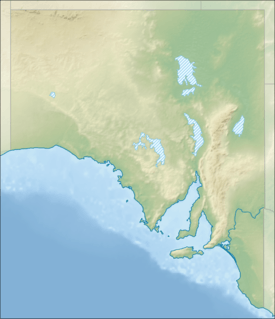Cape Torrens Wilderness Protection Area
| Cape Torrens Wilderness Protection Area South Australia | |
|---|---|
|
IUCN category Ib (wilderness area) | |
 Cape Torrens Wilderness Protection Area | |
| Nearest town or city | Parndana |
| Coordinates | 35°43′30″S 136°45′00″E / 35.72500°S 136.75000°ECoordinates: 35°43′30″S 136°45′00″E / 35.72500°S 136.75000°E |
| Established | 27 April 1972[1] |
| Area | 9.4 km2 (3.6 sq mi)[2] |
| Managing authorities | Department of Environment, Water and Natural Resources |
| Footnotes | Coordinates[1] |
| See also | Protected areas of South Australia |
Cape Torrens Wilderness Protection Area, formerly the Cape Torrens Conservation Park, is a protected area on Kangaroo Island, South Australia. It was originally dedicated on 27 April 1972 to conserve remnant native vegetation with outstanding coastal and cliff scenery and proclaimed as a wilderness protection area on 15 October 1993.[2][3]
Description
The park has an area of 940 ha (2,300 acres) with 7 km (4.3 mi) of coastline including Cape Torrens. It lies towards the western end of the island’s north coast. It is characterised by a coastal ridge and the scenic cliffs typical of the north coast, declining in altitude further inland. The cliff tops carry a coastal complex dominated by Acacia paradoxa, grading inland to open eucalypt scrubland. The ridge has patches of Eucalyptus cladocalyx woodland with an understorey of Hakea rostrata, Xanthorrhoea tateana and Lasiopetalum sp.[4] The wilderness protection area is classified as an IUCN Category Ib protected area.[1]
Wilderness qualities
The following qualities have been identified by the government agency managing the wilderness protection area:[3]
The area is outstanding for the biological integrity of its native forest and woodland, and for its wild coastal scenery. It also contains habitat for the endangered Glossy Black-cockatoo. The wilderness quality of Cape Torrens Wilderness Protection Area is recorded as high, as it is undisturbed by structures and impacts of modern technology. There are no internal tracks and the vegetation is virtually pristine.
References
- 1 2 3 "Terrestrial Protected Areas of South Australia (see 'DETAIL' tab)". CAPAD 2014. Australian Government - Department of the Environment. 2014. Retrieved 13 March 2015.
- 1 2 "Protected Areas Information System - reserve list (as of 17 Feb 2014)" (PDF). Department of Environment Water and Natural Resources. Retrieved 27 March 2014.
- 1 2 "Wilderness Advisory Committee Annual Report 2012-13" (PDF). September 2013: 15. ISSN 1832-9357. Retrieved 17 March 2014.
- ↑ Anon (1987). Conservation Parks of Kangaroo Island Management Plan (PDF). Adelaide: Department of Environment and Planning, South Australia. ISBN 0-7243-8983-0.